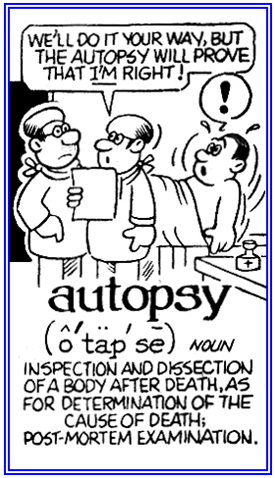op-, opt-, optico-, opsi-, opso-, -opia, -ops, -opsia, -opsis, -opsy, -optic, -opic, -opy
(Greek: eye[s]; sight; see, vision)
2. Having eyes of unequal refractive power.
3. A condition in which the refractive power of one eye differs from that of the other.
2. A form of color blindness where reds and greens look much the same.
In amblyopia, or argamblyopia, the brain favors one eye over the other. The other eye is ignored. It is not adequately stimulated and the visual brain cells do not mature normally. Amblyopia is the most common cause of monocular blindness, partial, or complete blindness in one eye.
2. An ocular view.
3. A postmortem examination.
2. The examination, after death, of an animal body, usually human, with the intent of determining the cause of death, the extent of a disease or injuries, the effect of therapy, and the existence of any previously unrecognized antemortem pathological condition: After Mary’s young cat, Mini, died, she wanted to know whether it had been poisoned and so an autopsy was performed by the veterinarian.

Go to this Word A Day Revisited Index
so you can see more of Mickey Bach's cartoons.
The temporal halves are located on each side of the head, back of the eyes and forehead, above the zygomatic arch and in front of the ears.
2. Drooping of an upper eyelid because of paralysis.
Causes include aging, diabetes, stroke, Horner's syndrome (nerve condition which involves a dropping eyelid), myasthenia gravis (fatigue of certain voluntary muscle groups), brain tumor or cancer.
Related references to "eye" or "eye part" word families: blepharo-; core-; corneo-; eye, eyes; irido-; lenti-, lens-; lenticulo-; ocelli-; oculo-; ophthalmo-; phaco-; pupillo-; retino-; uveo-.
Cross references of word families that are related directly, or indirectly, to: "appear, visible, visual, manifest, show, see, reveal, look": blep-; delo-; demonstra-; -orama; pare-; phanero-; phant-; pheno-; scopo-; spec-; vela-, veal-; video-, visuo-.


